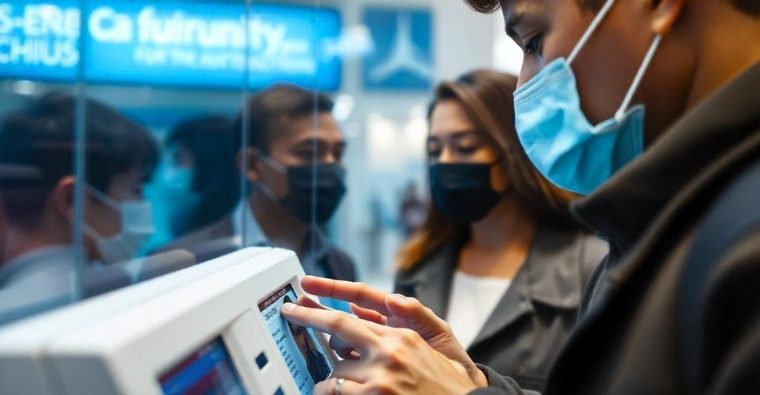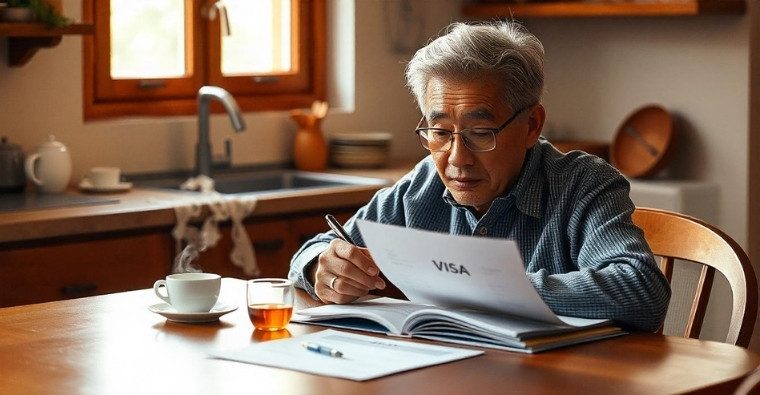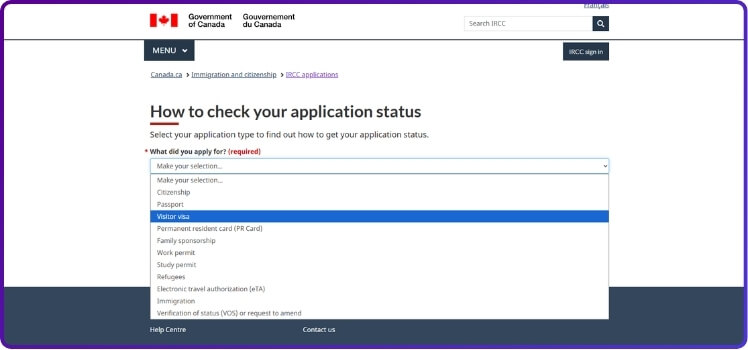Many applicants believe that once biometrics are completed, their visa is almost guaranteed. In reality, biometrics only confirm identity and security checks, while the final outcome still depends on eligibility and documents. That’s why people often ask: Can a visa get rejected after biometrics?
Yes, a visa can be rejected after biometrics. Biometrics only confirm identity, while approval depends on background checks, eligibility, and documents. Issues like insufficient funds, weak ties, or past violations can still lead to refusal.
Understanding why this can happen and what steps you can take next is important for every applicant. From addressing weak evidence to preparing stronger ties to your home country, knowing the details can help you avoid another refusal. Let’s break down how the process works and what you should keep in mind.
Can a Visa Get Rejected After Biometrics?
Have you ever wondered if getting your biometrics done means your visa is almost guaranteed? It’s a common belief among applicants, but the truth is a little more complicated. Biometrics may feel like the “final step,” but in reality, they’re only part of the process. Your visa can still be rejected even after biometrics are completed, and understanding why this happens is important for every applicant.

Biometrics like fingerprints and facial scans are collected mainly for identity verification and security checks. They allow immigration authorities to confirm you are who you claim to be, prevent fraud, and cross-check your details against international databases. Once that step is done, however, the actual decision on your visa still depends on a variety of other factors that go far beyond biometric data. For example, whether you are planning a tourism, family visits, studies, or attending a global conference in Canada, the USA, or the UK, the officer will still look at your financial readiness, intent, and supporting documents before making a decision.
So yes, a visa can absolutely be refused after biometrics, and here are the main reasons why:
Incomplete or Weak Documentation
Even if you’ve given biometrics, your supporting documents remain the foundation of your application. Missing bank statements, unclear letters of invitation, or inconsistent travel history can raise doubts. Immigration officers rely on documents to measure eligibility, and if these aren’t convincing, biometrics won’t save the application.
Financial Stability Concerns
Visa officers want reassurance that you can afford your trip and won’t become a financial burden on the country you’re visiting. If your financial records don’t prove stability—whether due to insufficient savings, unclear income sources, or sudden unexplained deposits—this can lead to rejection even after the biometric step.
Weak Ties to Home Country
For temporary visas, officers must be confident you’ll return home. If you don’t show strong ties like a stable job, property ownership, or family responsibilities, your application can still be denied. Biometrics confirm your identity, but they don’t prove your intent to return.
Security and Immigration History
Biometric information is checked against global security and immigration databases. If your record flags past overstays, deportations, or even suspected security issues, officers may reject the application despite your biometrics being valid.
Medical and Public Health Concerns
In some cases, particularly for long-term or residency visas, medical examinations are required. If these raise red flags that could pose a risk to public health or strain healthcare systems, biometrics won’t override those concerns.
Purpose of Travel Not Matching the Visa
If your stated reason for visiting doesn’t align with the type of visa you’ve applied for. For example, applying for a tourist visa while actually planning to work, the officer may consider your intent misleading. This mismatch often results in refusal.
Past Visa Refusals
Previous rejections don’t automatically disqualify you, but they are reviewed closely. If the same issues from past refusals remain unresolved, your application can face the same fate even after biometrics.
Biometrics are an important security step, but they are not a guarantee of approval. A visa can still be rejected if documents are incomplete, financial stability is unclear, ties to your home country are weak, or security/health concerns exist. The key is to treat biometrics as one part of the larger process, not the final hurdle.
What Biometrics Do and Don’t Do in Visa Processing?
Biometrics often feel like the “serious step” in a visa application, but many applicants still wonder what they actually mean for their case. If you’ve ever questioned what is biometrics, it refers to unique traits like fingerprints and facial scans that help verify identity. This step plays a vital role in confirming who you are and preventing fraud, yet it doesn’t decide the visa outcome on its own. Let’s look at what biometrics really do, what they don’t, and the common misunderstandings around them.
What Biometrics Actually Verify
When people search for biometrics meaning, they’re usually asking how it works in practice. In simple terms, biometrics capture details such as fingerprints, facial scans, or iris data to build a secure digital identity.
- Capture fingerprints, facial scans, or iris data to create a unique digital identity.
- Cross-check identity against global immigration and law-enforcement databases.
- Stop duplicate applications or stolen identity cases before decisions are made.
- Strengthen security at visa centers and border checkpoints.
What Drives Approval/Refusal (Eligibility Factors)
While biometrics confirm identity, the decision itself comes from other parts of your file. Immigration officers focus on eligibility requirements to judge whether you qualify for a visa.
- Accuracy and completeness of documents such as bank statements or letters of invitation.
- Financial stability is shown through income records and savings.
- The purpose of the visit aligns with the visa category requested.
- Ties to the home country like work, property, or family obligations.
- Results of background and health checks that may affect eligibility.
Common Misconceptions About Biometrics
Applicants often assume biometrics carry more weight than they actually do. Many even believe that simply giving a biometric test for visa approval is enough, but that’s far from reality. Clearing up these misunderstandings helps set realistic expectations for the visa process.
- Belief: Biometrics guarantee visa approval → Reality: They only verify identity.
- Belief: Biometrics replace paperwork → Reality: Documents remain essential.
- Belief: Biometrics are one-time use → Reality: Some countries reuse them for years (Canada: 10 years; Schengen: 59 months).
- Belief: Biometrics speed up the whole process → Reality: They only help background checks run faster, not the final review.
What Happens After Biometrics: By Country?
Once you’ve given your biometrics, many people wonder what happens next. The process looks a little different depending on the country where you applied. Each system has its own rules, timelines, and ways of sharing results. Let’s break it down step by step so you know what to expect.
Canada (IRCC)
Biometrics in Canada are valid for 10 years, so you usually don’t need to give them again for future temporary applications. After submission, IRCC updates your online account with status changes and final decisions. Knowing the next steps after biometrics for Canada visa is important because that’s when background checks, eligibility reviews, and final decisions begin.
- Decisions appear in your IRCC account as a letter or notification.
- Biometrics stay valid for 10 years for most applicants.
- Refunds for biometric fees are rare once processing begins.
- You can track updates directly through the IRCC portal.
United Kingdom (UKVI)
For UK visa applications, once biometrics are given, your details are passed to UKVI for processing. You’ll get an email or letter with the final decision. If your visa is refused, you may have review options depending on the category.
- Decision notice comes by email or letter.
- Some categories allow an administrative review, while others may allow a full appeal.
- Biometrics may also be reused if you apply again within a set timeframe.
- Official updates come from the UKVI system, not the visa center.
United States (Dept. of State)
In the U.S., biometrics for us visa applicants are mainly collected for background and security checks. The decision itself still depends on the interview and documents. Refusals often fall under two common sections of law: 221(g) or 214(b).
- 221(g): means the officer needs more documents or security checks before deciding.
- 214(b): refusal when the officer believes you don’t qualify for that visa type.
- Status updates are available on the CEAC tracking system.
- Biometrics are stored for future applications and checks.
Schengen
For Schengen visas, biometrics are stored for 59 months (just under 5 years). This means you can reuse them for new applications during that time. However, the visa is never guaranteed entry into the country, border officials still make the final call.
- Biometrics are valid for 59 months across Schengen states.
- Decisions are usually given as a visa sticker or a refusal notice.
- Border officers may still refuse entry even with a valid visa.
- Information is shared across all Schengen member countries.
Biometrics may be handled differently depending on where you apply, but in every country, they’re used to confirm identity and run checks. The real outcome always comes later, and knowing these differences helps you prepare better for each system.
What to Do If You’re Refused (Country-Specific Routes)
Facing a visa refusal can feel frustrating, especially after completing biometrics and waiting for an outcome. Each country has its own way of handling refusals, and knowing these options makes a big difference. The importance of biometrics for visa applications is clear because they confirm your identity, but the final decision still depends on documents, finances, and eligibility. Let’s look at how the process works across different regions.
Canada (IRCC)
In Canada, refusal reasons are explained in your IRCC account. Reading these notes carefully is the first step because they tell you exactly what went wrong. You can either reapply with stronger documents or, in limited cases, seek a judicial review.
- Review your refusal notes in the IRCC portal.
- Fix the issues before reapplying, such as missing documents or unclear finances.
- A judicial review is possible but usually reserved for serious errors in decision-making.
- Strengthen your next application with a cover letter addressing past concerns.
United Kingdom (UKVI)
For UK applications, the refusal letter or email explains whether you have the right to ask for an administrative review or, in some categories, a full appeal. An administrative review looks at errors in the original decision, while an appeal allows you to submit stronger evidence.
- Check your refusal notice for your available option.
- Administrative review: challenge a mistake made by UKVI.
- Appeal: submit more evidence and argue your case (only certain visas allow this).
- Always prepare an updated file with clearer evidence before re-submitting.
United States (Dept. of State)
In the U.S., most refusals fall under two categories. A refusal under section 221(g) means the officer needs more documents or further checks before deciding. A 214(b) refusal means the officer doesn’t believe you meet the visa requirements, usually related to ties to your home country.
- 221(g): Provide additional requested documents promptly.
- 214(b): Strengthen proof of ties to your country before reapplying.
- Check your case status on the CEAC website for updates.
- There’s no formal appeal, but reapplying with stronger evidence is allowed.
Schengen
For Schengen visas, refusals usually come with a clear reason listed on the refusal form. Each country has slightly different rules, but you can often reapply once you’ve fixed the issue or, in some cases, appeal through national authorities.
- Read the refusal form for the stated reason.
- Reapply with a stronger file once issues are resolved.
- Appeals may be possible but vary by country.
- Remember: biometrics are valid for 59 months, so you won’t need to redo them immediately.
If you’re preparing to reapply or request a review, here are two ready-to-use templates that can guide you.
Template 1: Re-Application Cover Letter (General Use for Canada/US/Schengen)
[Your Full Name]
[Your Contact Details]
[Date]To: Visa Officer, [Embassy/Consulate/Immigration Office]
Subject: Re-Application for [Visa Type] – Addressing Previous Refusal
Dear Visa Officer,
I am reapplying for a [visa type] following the refusal dated [insert date]. The refusal letter cited [state the reason]. I have carefully reviewed these concerns and made the following improvements:
- Reason 1 noted in refusal → Evidence now provided: [list supporting docs].
- Reason 2 noted in refusal → Evidence now provided: [list supporting docs].
- Additional clarification → I have attached updated documents that confirm [example: stronger financial proof, clearer travel purpose, or home country ties].
I respectfully request that you review my updated application and the evidence provided. I believe these corrections demonstrate my eligibility under the current visa requirements.
Thank you for your time and consideration.
Sincerely,
[Your Name]
Template 2: UK Administrative Review Outline
[Your Full Name]
[Application Reference Number]
[Visa Type]
[Date]To: UK Visas and Immigration (UKVI)
Subject: Administrative Review Request – Visa Refusal Decision Dated [insert date]
Dear Sir/Madam,
I am requesting an administrative review of my visa refusal decision. I believe there was an error in assessing my application.
- Decision point 1: [Quote from refusal notice]
Error/Correction: [Explain why this was incorrect, referencing evidence already submitted].- Decision point 2: [Quote from refusal notice]
Error/Correction: [Explain why this was incorrect, referencing evidence already submitted].I am not submitting new documents at this stage, as per the rules of administrative review. This request is based only on errors made in assessing my original application.
I kindly request that my case be reviewed again in light of these points.
Yours sincerely,
[Your Name]
After-Biometrics Timelines & How to Track Your Case?
Once biometrics are submitted, many applicants expect an immediate answer. The truth is, each country follows its own post-biometrics timeline and way of updating applicants. Understanding these steps makes the waiting period less stressful. Let’s go through the main points together.
Post-biometrics Milestones (country-aware)
Each visa system has different milestones after biometrics, and many applicants often ask about the Canada visitor visa processing time after biometrics in particular. These timelines vary, but the steps below show how cases usually move forward.
- Canada (IRCC): Status moves from “Biometrics completed” → “Background check in progress” → “Final decision.”
- UKVI: Application moves to the “processing” stage, then results are sent by email or courier.
- U.S. Dept. of State: Case shows as “Administrative Processing” or “Issued/Refused” on the CEAC site.
- Schengen: File is reviewed by the consulate, then a decision letter or visa sticker is issued.
Where to Check Status (portal, email, VAC)
Applicants often ask about the Canada visa processing time after biometrics. Updates are shown in the IRCC portal, and while Canada visa time after biometrics varies, most decisions appear once background checks are cleared.
- Canada: Updates show in the IRCC online account.
- UKVI: Decision notices are emailed, plus updates may appear in the application portal.
- United States: Track progress through the CEAC online system.
- Schengen: Most updates are shared through the Visa Application Center (VAC) website or email alerts.
Passport Request Monitoring & Upload Windows
The final stage often involves sending your passport or uploading final forms. Keeping track here is crucial.
- Canada: You’ll receive a Passport Request Letter (PPR) in your IRCC account when approved.
- UKVI: Courier or pickup details are provided once a decision is made.
- United States: Approved applicants are told when and where to submit passports for stamping.
- Schengen: Passports are collected at the VAC along with the visa decision.
While timelines and status updates differ across countries, the process always moves step by step. Tracking carefully through the right portals and emails saves you from missing important notices and helps you stay prepared for the final decision.
Re-Application Strategy That Actually Works
A refusal isn’t the end of your visa hopes. It’s a chance to learn what went wrong and fix it. By looking closely at the refusal letter and improving weak areas, you can come back with a much stronger application.
Read the Refusal Letter Like a Checklist
Your refusal letter is your guide. Go through it carefully, highlight each reason given, and think of what evidence or documents can directly address those points. Treat it like a step-by-step list for your next application.
Template A: Refusal Response Plan
Purpose: To break down a refusal letter into clear steps.
Applicant Name: ____________________
Visa Type: ____________________
Date of Refusal: ____________________
Refusal Reason 1: ____________________
Action to Fix: ___________________________________________
Evidence to Add: _________________________________________
Refusal Reason 2: ____________________
Action to Fix: ___________________________________________
Evidence to Add: _________________________________________
Refusal Reason 3: ____________________
Action to Fix: ___________________________________________
Evidence to Add: _________________________________________
Use this plan as your checklist before reapplying to make sure every issue is addressed.
Close Evidence Gaps (funds, itinerary, ties)
Weak evidence is one of the most common reasons for refusal. Strengthen your file with updated bank records, confirmed travel bookings, and documents showing ties to your home country. The clearer your proof, the easier it is for officers to trust your case.
Template B: Proof of Ties Worksheet
Purpose: To collect strong evidence that shows you will return to your home country.
Category: Employment
- Job title & employer: ____________________
- Contract/letter attached: Yes / No
Category: Property/Assets
- Property/land details: ____________________
- Proof of ownership attached: Yes / No
Category: Family Commitments
- Spouse/children details: ____________________
- Documents (birth/marriage certificates): Yes / No
Category: Community/Other Ties
- Memberships, education, or other responsibilities: ____________________
- Proof attached: Yes / No
Tick off each section you can support with documents. The more ties you show, the stronger your case.
Write a Clear Cover Letter (map issues → fixes)
A short cover letter helps connect everything. Use it to explain the changes you made since the refusal, and point out the documents that fix each concern. This shows the officer you’ve addressed the exact problems from before.
Template C: Re-Application Cover Letter
Purpose: To explain how you addressed the refusal points.
[Your Name]
[Your Contact Details]
[Date]To: Visa Officer, [Embassy/Consulate/Immigration Office]
Subject: Re-Application for [Visa Type] – Addressing Previous Refusal
Dear Visa Officer,
I am reapplying for a [visa type] following the refusal dated [insert date]. The refusal letter noted the following concerns:
- [Refusal reason] → Updated evidence: [explain fix].
- [Refusal reason] → Updated evidence: [explain fix].
- [Refusal reason] → Updated evidence: [explain fix].
I have attached all supporting documents to demonstrate that these concerns have been resolved. I kindly request that my application be reconsidered in light of this updated evidence.
Thank you for your time and review.
Sincerely,
[Your Name]
When to Wait vs Reapply Immediately
Not every case should be refiled right away. If the refusal was due to something simple like a missing document, you can apply again quickly. But if it was tied to finances or unclear travel plans, take some time to build stronger evidence before reapplying.
FAQs About Can a Visa Get Rejected After Biometrics
Many applicants still have questions even after understanding the main reasons for refusals. To make things easier, here are some common concerns people often ask about, along with simple and clear answers you can rely on.
Can My Biometrics Be Used for Future Applications?
Yes, most countries allow biometrics to remain valid for several years. For example, Canada keeps them for 10 years, while Schengen keeps them for 59 months. This means you don’t always need to give them again.
Will A Visa Refusal Affect My Future Travel Plans?
A single refusal doesn’t block you from applying again or traveling elsewhere. However, future applications may be reviewed more closely. The key is to fix the reasons that caused the first refusal.
Do I Need to Hire an Immigration Consultant After Refusal?
Hiring a consultant is not mandatory, but it can be helpful if your case is complex. They can point out weak spots you may have missed. Many people succeed on their own with careful preparation.
How Long Should I Wait Before Submitting a New Application?
There is no strict waiting period in most cases. If your refusal was due to simple errors, you can reapply quickly. But if bigger issues exist, waiting until your evidence is stronger is wiser.
Can I Request My Visa File Notes From Authorities?
Yes, in some countries like Canada, you can request GCMS notes that show the officer’s detailed reasoning. These records give more insight than the refusal letter. They can be very useful for planning your re-application.
Does a Refusal Mean I Lose My Biometric Fee?
In most cases, yes, the biometric fee is non-refundable because the service was already provided. However, you don’t need to pay again if your biometrics remain valid for future applications.
Can Border Officials Still Deny Entry After Visa Approval?
Yes, even with a valid visa, entry is never guaranteed. Border officials have the final say when you arrive. They can refuse if your answers or documents at entry raise concerns.
Concluding Words
Reaching the end of the visa process can be stressful, especially if the result is not what you expected. A refusal after biometrics may feel discouraging, but it doesn’t mean your chances are over.
The key is to carefully review the reasons provided and make changes where needed. Whether it’s stronger documents, clearer financial proof, or better evidence of ties to your home country, every small step adds strength to your next application.
So, can a visa get rejected after biometrics? Yes, but it’s not the final word. With patience, better preparation, and a focused strategy, you can improve your chances and move closer to approval the next time you apply.









Biometric and registration fee in Canada is necessary to pay
Yes, paying the biometric fee is a necessary part of the Canada visitor visa application process. Most applicants aged 14 to 79 are required to provide biometrics—fingerprints and a photo—after submitting their application. The biometric fee is CAD $85 per individual or a maximum of CAD $170 for families applying together at the same time.